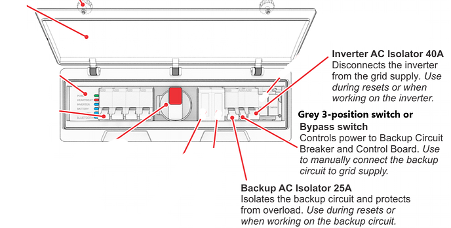The power cuts out and comes back, but there's no circuit breakers off? You just need to move your grey 3-position switch on the inverter to the "Up" position.
Symptoms
Are you having mini-blackouts to parts of your house power? Do some circuits go off and then come back on again, and the circuit breakers or fuses are fine? Don't worry, this simply means you are overloading the backup circuit and the inverter shuts down to protect itself.
How do I fix it?
Simple. Go to the inverter, open the front panel and identify the grey 3-position switch. Move it to the Up (Bypass) position. See the diagram below.

Do I leave it there?
You can leave it there, in which case you can't overload the inverter, but the compromise is that in event of a true grid blackout you will lose power to the whole house. In that case you will simply move the 3-position switch back down to “Backup”.
Why would I leave it in the Bypass position?
We think this gives you the most flexibility. You can use all your appliances, then if the grid goes down, your power will be back on, and exclusively for you, at the flick of a switch.
Why does this happen?
On install day your installer should have explained that we can select one house circuit to place on a 'backup' circuit, and you can enjoy your solar or battery power if the grid goes down.
The tricky part of this is that the inverter has a limit of 21A on this backup line, and unless we rewire the whole house it is often better just to select the main light and power circuits to back up. Then when the grid is down you have a lot of circuits available in the house. Some things like 3-phase circuits on a 1-phase inverter can't be on the backup, and big loads like hot water systems, fan/heaters (IXL) and big air conditioning units. If we backed them up the beer fridge would miss out! Instead we try to work with you to select important circuits like fridge, lights, TV and internet and back those up.

As we said it isn't always that simple, and if you overload the inverter (like a hot day, using the microwave, kettle and the dishwasher) the inverter will shut off for a while to rest, then come back up, look around and see if that big load is still there.
If you have any questions please don’t hesitate to get in touch.
